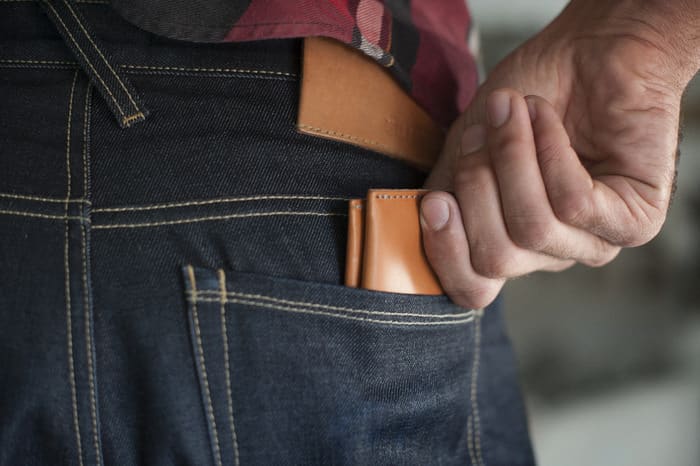Have a ‘fat wallet’? That’s great for you, but it’s not good for your back. Many men are in the habit of carrying their wallet or mobile phone in their back pocket. The way men’s jeans or trousers are tailored means that it’s easy to keep things in your back pocket, men’s pockets are deep and low sitting, unlike women’s trousers, which are usually shallower, higher and can cause items like a wallet to pop out when they sit down. Your back pocket may seem like the perfect spot for your cards, money, keys and coins and your pocket was designed with this very purpose in mind, but we recommend that you consider using a different spot.
How does keeping stuff in my back pocket hurt my back?
When you sit on something in your back pocket, especially for prolonged periods, you put stress on your hip joint and lower back. In 1978, Elmar Lutz M.D described this problem as ‘Wallet Sciatica’. Modern times have not relieved this problem, in fact, we now have a new regular in our back pockets – our mobile phones. Orly Avitzur, M.D specialises in neurology and wrote an article for Consumer Reports titled ‘Cell Phone Sciatica is a Pain In The Butt’. She said; ‘Cell phone sciatica can now join several related nerve compression syndromes, including wallet sciatica, credit card sciatica and back-pocket sciatica … Pressing any hard object against the derriere, home of the sciatic nerve, is a bad idea.’
Your sciatic nerve runs through your leg and starts right behind your hip joint. When you sit with something hard in your back pocket it can get pinched between your wallet and the hip. The pain starts from the hip area, but can spread all down your leg and can make movement increasingly difficult. Sitting with something in your back pocket can also tilt your pelvis to the side, putting additional stress on your spine. Stuart McGill Ph.D, professor of spine biomechanics at The University of Waterloo, says that when you sit this way, you begin to round your lower back. Instead of sitting upright in the correct posture, you become arched over, the bigger the size of your wallet or phone, the more your back becomes hunched.
What does sciatica feel like?
Sciatica can be very uncomfortable and painful. It doesn’t generally feel sharp like other kinds of back pain, it tends to be a more tingly and burning type of pain. It is usually worse in your buttock area and presents on one side, but you can sometimes feel the pain all the way down your leg into your foot. It can cause decreased mobility in your legs. It tends to be worse after you’ve been sitting or laying down, and exercise can provide some relief. Most people find their sciatica goes away after a few weeks, but if it’s lasted longer than six weeks, you should get professional help to deal with it. We’ve written about sciatica in more detail here.
Where should I put my wallet, phone and keys?
Putting things in your front pocket isn’t much better, as it can create an uncomfortable pinch in your thigh. If you don’t like the idea of carrying a small bag or putting things in your coat pocket, make sure that when you’re driving or sitting down, take your wallet out and put it on the table, or your dash board.
If you’ve been carrying your wallet in your back pocket for decades without any thought and are experiencing back pain, this simple change could provide a lot of benefit to you. If you’re struggling with on-going or reoccurring sciatica, then physiotherapy can help. There have been many advances in technology that make treating sciatica easier and more effective, such as spinal decompression therapy (IDD therapy) or PAMM therapy, where the physiotherapist uses a special handset to realign the spine and restore movement to it. Call us on 0114 268 6677 or email info@sheffieldphysiotherapy.co.uk for more details.


